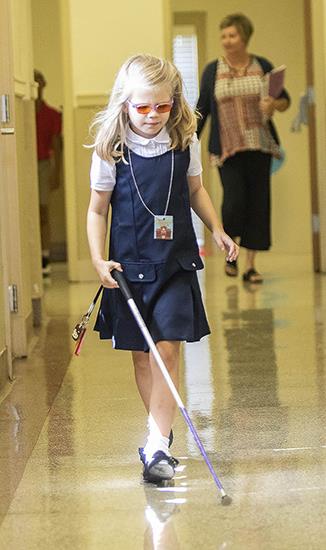Applying To Our Schools
-

For many parents, the decision about where to send their child who is deaf, blind or deafblind to school is a difficult one. While some children with sensory loss function well in a classroom predominantly intended for hearing and sighted children, others tend to thrive while living and learning with other deaf or blind children facing the same challenges where they feel accepted and are afforded more opportunities to develop leadership, athletic and other skills. In addition, at a residential school, students will experience daily contact with role models in their teachers and other staff who may have vision or hearing loss, and participate fully in every activity of a typical school, instead of being left out or having to interact through interpreters.
Enrollment as a day student is also an option for AIDB for families living within reasonable driving distance of the campuses. We operate a number of daily bus routes within a 45-mile radius of Talladega. And for residential students, a fleet of buses leave AIDB every third weekend to take students home for a long three-day weekend throughout Alabama. The bus trips home are free; just like tuition, room and board. Weekly bus routes also give students in Montgomery, Birmingham and Huntsville an option to go home each Friday.
 AIDB also offers a variety of support and technical services for children with hearing and vision loss enrolled in public schools throughout Alabama – sharing our expertise, resources and technology to the best extent possible.
AIDB also offers a variety of support and technical services for children with hearing and vision loss enrolled in public schools throughout Alabama – sharing our expertise, resources and technology to the best extent possible.Our Admissions Office works with families interested in enrolling children at Alabama School for the Deaf (ASD), Alabama School for the Blind (ASB) and Helen Keller School of Alabama (HKS). To develop an educational plan that truly meets the child’s needs, an in-depth admissions process is needed.
We accept applications year-round, for students ages three to 21 who have vision or hearing loss. The application packet requires you to send school records, vision or audiological records and applicable medical records. If you’d like to receive an application packet in the mail, email your request to Admissions Director Mandy Griffin at griffin.mandy@aidb.org.
We first assist parents with gathering medical and school records, so we can assess where a child is starting from. After we receive this information and an application, a time is scheduled for the family to come to AIDB. A detailed evaluation is performed, which may include vision testing, audiological exams, intellectual and educational testing and interviews. The evaluation may take a few days or more. During this time, the family also has a chance to meet teachers and administrators and look around the campuses of the three schools.
Once we have determined that we can assist a child, an admissions review team will meet to decide which program will be most effective for the individual child. Some children are best served at HKS, while others may be placed at ASB or ASD.
The school year usually begins around the second week in August. Students living in Alabama do not pay tuition or room/board fees. All students must meet AIDB admission criteria.
Whether children attend local schools or the residential programs in Talladega, AIDB has more than a century of experience in helping them excel, and we have an enduring commitment to children and adults who are deaf or blind all over the state.
We welcome your questions. Please call Admissions Director Mandy Griffin at 1-800-532-4622 or 256-761-3284 or by email at griffin.mandy@aidb.org.

